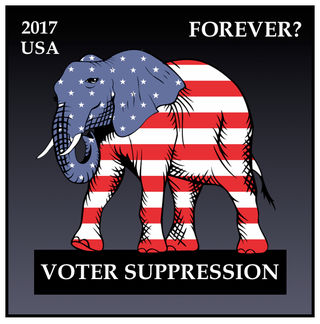President Donald Trump
Bait and Switch: Psychology and Trump’s Voter Fraud
The phantom menace of voter fraud is used to restrict voting rights.
Posted January 30, 2017

In recent days President Trump has, yet again, asserted that millions of people illegally voted against him last November. Lies of such magnitude and consequence from the White House certainly deserve the attention and scorn they’ve received. After all, once we move beyond the realm of “alternative facts,” the real evidence shows that a person is more likely to be struck by lightning than to impersonate someone else at the polls.
But to fully understand Trump’s complaints about “illegal voters,” we need to recognize that voter fraud and voter suppression are opposite sides of the same coin. By promoting beliefs about the former, the groundwork is laid for pursuing the latter. In this way, tales of unlawful voting have long been a pretext for obstructing the voting rights of U.S. citizens.
The mass manipulation at the heart of this strategy relies on what I call the “combating-injustice mind game.” With two steps, this psychological ploy preys upon the public’s acute and compassionate sensitivity to issues of right and wrong. First we’re bombarded with dire warnings that something terribly unjust is happening. These overwrought claims aim to spur broad outrage and demands for reform.
Then the propagandists step forward with carefully crafted proposals for how to address the purported injustice. But there’s a catch. Their recommended changes are designed with a very different goal in mind: to advance a narrow self-aggrandizing agenda, one that leaves those who were already disadvantaged even worse off than before. So, behind the seductive façade of combating injustice, wealth is extracted, power is entrenched, and the common good is trampled.
In short, complaints of rampant voter fraud are really just an elaborate cover story, constructed to hide repugnant attempts to gain electoral advantage by disenfranchising Americans. Paul Weyrich, for decades a leading voice of the conservative movement, indirectly acknowledged as much almost fifty years ago. In a speech in Texas back in 1980, he explained, “I don’t want everybody to vote. …Our leverage in the elections, quite candidly, goes up as the voting populace goes down.” That master plan hasn’t changed in the intervening years.
That’s why the Republican Party’s 2012 platform emphasized, “Every time that a fraudulent vote is cast, it effectively cancels out a vote of a legitimate voter”; why Reince Priebus, now Trump’s chief of staff, has argued that requiring a photo ID at the voting booth is “fair, reasonable, and just”; why others insist we must “keep fraudsters away from polling places” and “vote fraud pervades our election process”; why True the Vote, the Koch-funded Tea Party outfit, cunningly describes itself as “regular citizens standing up for fair elections”; and why the GOP’s 2016 platform endorsed legislation calling for both “proof of citizenship when registering to vote and secure photo ID when voting.”
It’s no surprise that the favorite targets of voter suppression efforts include African Americans, Hispanic Americans, students, and low-income workers. That's because most members of these groups are traditionally unlikely to vote Republican. They’re also less likely than most Americans to have a driver’s license or other valid photo ID.
But ID laws aren’t the only suppression tactics employed. For example, requiring physical proof of citizenship when registering to vote undercuts the effectiveness of low-income voter registration drives. Closing polling places on or near college campuses makes it tougher for students to vote. And eliminating early voting periods and same-day registration options particularly disadvantage voters of lesser means. These assaults are likely to shift into even higher gear if Alabama Senator Jeff Sessions is confirmed as the country’s next Attorney General. Sessions has described the Voting Rights Act as a “piece of intrusive legislation” and the NAACP and ACLU as “un-American.”
So the President and his allies are actually right when they warn of a dangerous plot to cripple and corrupt our democratic institutions. But the mischief doesn’t take the form of impersonators at the voting booth. Rather, electoral justice and the integrity of the ballot box are endangered by well-organized conservative efforts aimed at preventing some Americans from voting at all. Indeed, it’s the unjustly disenfranchised in the United States who truly number in the millions today.


